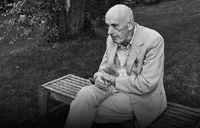
Ian Porteus Howard, Distinguished Research Professor Emeritus and founder of York University’s Centre for Vision Research, was diagnosed with inoperable cancer a few weeks ago and died on June 1. He was 85.
Prof. Howard was born in Rochdale, Lancashire, in the North of England in1927. His father was a foundry worker from Warrington and his mother had been a weaver in the Rochdale cotton mills. He attended Ulverston Grammar School in the United Kingdom, but left school at the age of 16 and worked for several years in industrial chemical laboratories, while studying chemistry and biology at night school.
He entered Manchester University in 1948 to study chemistry and biology but changed to psychology and physiology during his second  year, obtaining a BSc in psychology in 1952. He then worked at Durham University in the Northeast of England as a research assistant in the newly founded Psychology Department. In 1953 he was appointed lecturer.
year, obtaining a BSc in psychology in 1952. He then worked at Durham University in the Northeast of England as a research assistant in the newly founded Psychology Department. In 1953 he was appointed lecturer.
He married Antonie (Toni) Eber in 1957 with whom he had three children, Ruth, and twins Neil and Martin. Prof. Howard was a visiting associate professor in the Department of Psychology at New York University in 1965, the year he obtained a PhD from Durham University. He published his first book, Human Spatial Orientation, with W. B. Templeton in 1966.
He came to York University in 1966 with the intention of building a concentration of people interested in vision. Prof. Howard was promoted to full professor in 1967 and was chair of the Department of Psychology, from 1968 to 1971. During that time he recruited several visual scientists and continued to be influential in attracting more to form the York Vision Group. The group became an official York Research Unit under the title the Centre for Vision Research in 1992. In 1988, together with David Martin Regan, Prof. Howard founded the Human Performance Laboratory of the Institute for Space and Terrestrial Sciences. This was an Ontario Centre of Excellence with its headquarters at York University. It was later renamed the Centre for Research in Earth and Space Technologies (CRESTech).
Prof. Howard’s initial research, starting in the late 1950s, investigated perceptual ambiguity, visual-motor co-ordination and eye movements. When he came to York, he researched several aspects of spatial orientation, including vection, induced motion and torsional and vergence eye movements. He retired from his teaching appointment at York University in 1993 to become a senior scientist with CRESTech when he became interested in stereoscopic vision. He continued to work on human spatial orientation, sponsored by grants from NASA, the Canadian Space Agency, and the Defence and Civil Institute of Environmental Medicine (DCIEM).
He leaves an impressive legacy of original scientific discoveries, as well as several highly influential books, including Human Visual Orientation (1982), Binocular Vision and Stereopsis (1995 with Brian Rogers), Seeing in Depth (2002, 2 volumes, with Brian Rogers) and most recently Perceiving in Depth (2012, 3 volumes, with Brian Rogers). The Centre for Vision Research hosted a Festshrift for him in 2001 the proceedings of which were published as Levels of Perception (2002), edited by York psychology Professor Laurence Harris, director of the Centre for Vision Research, and Professor Michael Jenkin of York’s Lassonde School of Engineering.
In addition to his professional interests, Prof. Howard had a lasting interest in belief systems of all kinds. He was a confirmed atheist and sceptic about all things supernatural and most things political. He enjoyed reading history, listening to classical music, walking, especially in the English countryside, woodworking and sculpting, and composing games for which he was famous. Some of these novel games were tried out at the regular, famous parties that he and Toni hosted at his house and in his condo in Sarasota, Florida, where he was a well known figure at the annual ARVO conference.
He is survived by his wife, Toni, his three children and seven grandchildren. He will be greatly missed.
A memorial service will be arranged shortly. For details, contact 905-889-0157 or martinhoward@sympatico.ca.
